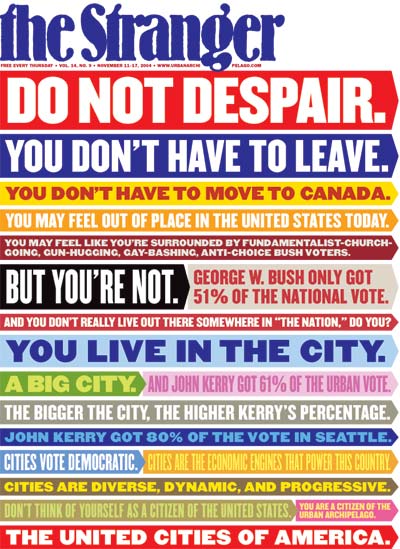ONLY NOISE: The Day the Country Died

“Do not despair. You don’t have to leave. You don’t have to move to Canada. You may feel out of place in the United States today. You may feel like you’re surrounded by fundamentalist-church-going, gun-hugging, gay-bashing, anti-choice Bush voters. But you’re not.”
This was a portion of the cover Seattle’s culture rag The Stranger ran in November 2004 when George W. Bush was reelected. I remember it well. I remember it well, in part, because that cover page has been framed and hung on the wall of my sister’s house since. The remainder of the text encourages Seattleites by reminding them “Kerry got 61% of the urban vote…got 80% of the vote in Seattle,” essentially praising the power of the “urban archipelago,” which some might consider a flaccid pat on its own back. A warm glass of milk while the world burned.
I remember this well because leading up to that day I had followed my dad to every political event we could find. To a Howard Dean rally in the months before Kerry’s nomination, to speeches by Michael Moore, Jim Hightower, and the venerable Amy Goodman. I remember it well because it was the period of time I was more involved in and educated about politics than I have ever been. All hope was on Dennis Kucinich in our household, who seems now like an early, less successful incarnation of Bernie Sanders. I remember it well because in the years leading up to Bush’s reelection, politics had hit a lot closer to home.
We lived in a small town. My Dad owned a mercantile in an even smaller town – one of 97 people, to be exact. One of those people was Justin Hebert, an exuberant teenage boy with wheat colored hair and a wily smile. He used to sweep the floors of my dad’s shop as an after school gig, and I, from a young age, had a massive crush him. Justin, like so many kids in my hometown, came from meager economic resources and couldn’t dream of being able to afford college tuition, despite his enormous desire to attend university. So, he joined the army, which plied him with the lure of travel and $50,000 towards college upon discharge.
As his obituary reported in 2003, “his flight to basic training was the first time he was ever in an airplane.” Justin was 20. He was the 250th American to die in the Iraq War, and the 52nd to perish after Bush so hubristically declared the war was over in May of that year. You remember that “Mission Accomplished” banner, don’t you?
I do. Like it was yesterday. Because that was my induction into politics. That banner searing into my brain as I heard the news of Justin’s death. That was the turning point for me. I carried the newspaper clipping of Justin’s obituary in a little hardback book that listed the Amendments to school every day, and would use it as ammo when scolded for not standing for the Pledge of Allegiance. All I wanted to talk about was politics from then on, an unpopular pastime for a middle schooler. In eighth grade I wrote a paper (much to the pride of my father and chagrin of my teachers) entitled “The Day the Country Died” as a simultaneous nod to the Bush administration and a Subhumans record by the same name.
The paper is now lost, likely in a dusty box in my dad’s garage somewhere. It was written by a 13-year-old, and is probably not very good. But in the fallout of what has transpired with this week’s election – and I know that was a lengthy preamble – I am reminded of that seventh-grade sentiment. That burning, sickening and powerless feeling. This is perhaps the first time in my life I have felt history seemingly repeat itself…like I am slumped in a parallel universe across from my thirteen-year-old self, asking with a quivering voice how this could possibly happen again.
I am no political analyst. I am no sociologist. I am not even a political journalist. However, it would feel irresponsible and delusional to write about anything else today. So I will write about it, with as much knowledge, honor and honesty as I can offer.
In my years of being scorned for wanting to discuss politics, the past several months have brought me so much joy, because, for the first time in so long, people were willing to talk again. They wanted to shout, even. To see folks my age so thrilled to support the Bernie Sanders campaign moved me in a way I’d never felt before, and I will continue to revere that memory. But after Bernie lost the DNC nomination to Hillary Clinton, I saw a kind of regression within the allegedly “progressive” peers all around me.
I cannot tell you the number of people I met, who so arrogantly snorted that they weren’t voting at all. These were educated, middle class, privileged people, such as myself. One woman, whom I met at a bar in Brooklyn, haughtily blurted that her “morals were worth more than stooping to the farce this election has become.” This woman was an educator (guess what programs consistently get cut first by conservative administrations?). She then went on to describe the magical utopia that is Burning Man.
One thing I have consistently encountered lately is this misdirected idea of how things actually work. You can go to Burning Man all you want if you can afford it, but you still live here. In reality. In the U.S. of A. And as of this election, you now live under the Trump administration. And it’s important to say that, no matter how difficult it is to hear. Because burying our heads, drinking ourselves numb, doing molly, and thinking this is only going to be a four-year thing, is the last thing we want to do right now. We must remember that whatever force was summoned to try to stop Trump from winning this election, needs to be amplified exponentially to make sure it never happens again.
Of the 44 pre-Trump leaders this nation has elected, less than 12 have been one-term presidents. The model tells us that incumbents almost always win reelection. So I would like to encourage all of us, four years in advance, to remember that, and to never have the thought “there’s no way that could happen!” again. Because it can happen. It just did.
It is a harsh reality we face today, tomorrow, and beyond. But I will not leave you on this note. If you’ve been kind enough to read this far, you’re due a bit of optimism. Optimism is not the atheist’s game. Many of you may believe in God, in the afterlife, in reincarnation. I have never believed in reincarnation on a metaphysical level. But I do believe in reincarnation on a historical level. The movements left unfinished from one era recur in the future, hopefully, closer to achieving their original goal with each wave, each rebirth.
The Suffragettes (and I am HEAVILY paraphrasing) carved a path for feminists in the ‘60s and ‘70s, and so they did the same for the contemporary feminist movement, which, let us not forget, took part in getting the first near-win for a female presidential candidate ever. From the abolition of slavery to the Civil Rights struggle, to the Black Lives Matter movement – it is a continuum that is unfortunate but necessary to keep improving the quality of human life in this country, especially when those in control consistently deny that there is a problem to begin with. So while I say that today is “The Day the Country Died,” please know I believe in its eventual rebirth.
In addition to all of the things I am not, I’m no historian. But if I had to propose a historical theory of progress, it would be this:
Progress seems to me like a hamster ball, moving along a horizontal axis. We humans are the hamster, the ball itself being micro-history: the events that occur within a generation’s lifetime. The horizontal axis being macro-history, meaning all the events that have ever happened and will happen in this big clusterfuck we call human history.
So. I envision that as the hamster fervently turns its ball, producing a dizzying amount of rotations, it cannot tell that it is simultaneously moving forward along the horizontal axis. It feels only the wild revolutions, the ups and downs, the unrelenting cycle of positive acceleration and negative regression in our shared history. But in fact, in tiny, infinitesimal increments, it moves forward along that horizontal line. It cannot go backward.
So please. Wither not. Do not let your education, your influence or your rights fall prey to your own cynicism.
Let’s push things forward.


